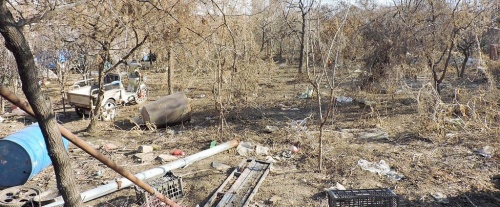Beijing’s Ryukyuan burial sites under threat of development

The burial sites for Ryukyuans who sought for the Chinese Qing Dynasty to save the Ryukyu Kingdom and died in exile before and after the "Ryukyu disposal", when the Ryukyu kingdom was annexed by the Meiji government in 1879.This photograph taken at Li Chan An Cun, Zhangjiawan, Tongzhou District, Beijing, on December 15, 2015.
January 4, 2016 Ryukyu Shimpo Tsuyoshi Arakaki reports
There are burial sites in Beijing for Ryukyuans (Okinawans) who sought for the Chinese Qing Dynasty to save the Ryukyu Kingdom and who died in exile before and after the “Ryukyu disposal”, when the Ryukyu Kingdom was annexed by the Meiji government in 1879. The burial sites, which are located in apple fields, are under threat of development, without investigation, and the remains and their relics are still left there.
Zhangjiawan Town, Tongzhou District, Beijing, where the burial sites are located, is included in the government development plan. Some of the capital functions will be moved to the area and a large theme park will be constructed. The construction will start this year. Chinese researchers on the history of relations between China and Ryukyu are striving to carry out excavation surveys and collect the remains, but time is limited.
Several burial sites for the Ryukyuan people, including envoys, students from the kingdom and royalists who sought to save their country from Japanese invasion, are found at Zhangjiawan. The gravestone of Wang Dayie, a royalist from Kume Village belonging to the scholar-officials class of the kingdom, stands there. About 14 Ryukyuan people are buried in the apple fields of Li Chan An Cun, Zhangjiawan. The apple fields are surrounded by traditional courtyard residences, which retain the feel of the old days. However, it is still easy to excavate the remains because of the fields.
Chinese scholars, including Bu Ping, the director of the Institute of Modern History, the Chinese Academy of Social Sciences, and Jiang Hong, a professor at Beijing Normal University, are striving to carry out an investigation to preserve the burial sites. Jiang said, “We will continue to work positively in order to excavate the Ryukyuan burial sites, restore and preserve them as proof of the history of friendship and exchange between China and Ryukyu for about 500 years.”
Tongzhou District Office has a plan to build a museum. An official of the district said, “We want to carry out an investigation before the start of the development, and we will collect the remains and their relics to preserve them in the museum.” However, future challenges remain, such as creating a concrete plan and how to get a budget for the project.
Seventeen Okinawan researchers, including Masaki Tomochi, a professor at Okinawa International University, sent a petition to Chinese scholars on December 14. Tomochi said, “The excavation and research for Beijing’s Ryukyuan burial sites and the restoration to preserve them are very important as proof of the long history of friendship and exchange between Ryukyu and China, and as a foundation for future friendship.”
Morikiyo Matayoshi, an affiliate professor at Okinawa University, has carried out research on the Ryukyuan burial sites in Beijing for many years. Matayoshi said, “These burial sites are the place to prove that Ryukyu staged a campaign for national salvation as an independent country, and also proof that the Ryukyu Kingdom had friendships and exchanges with countries of East Asia. We can’t allow valuable sites to be destroyed. We should seek for Chinese officials to carry out an early investigation through the Okinawa Prefectural Government.”
(English translation by T&CT)
Previous Article:New Year’s solemn ceremony at Shuri Castle
Next Article:Okinawa hits record high child poverty rate of 37%, 2.7 times higher than 2012 nationwide rate
[Similar Articles]
- Beijing approves the restoration and preservation of Ryukyuan graves
- Ryukyuan dance and Kumiodori performed in Beijing
- International Academic Conference in China considers shared historical recognition of the Ryukyu Kingdom
- Okinawa Governor Onaga meets Chinese Premier
- China to launch direct flights from Beijing to Naha four times a week
 Webcam(Kokusai Street)
Webcam(Kokusai Street)


